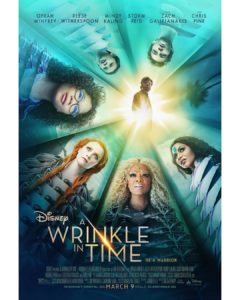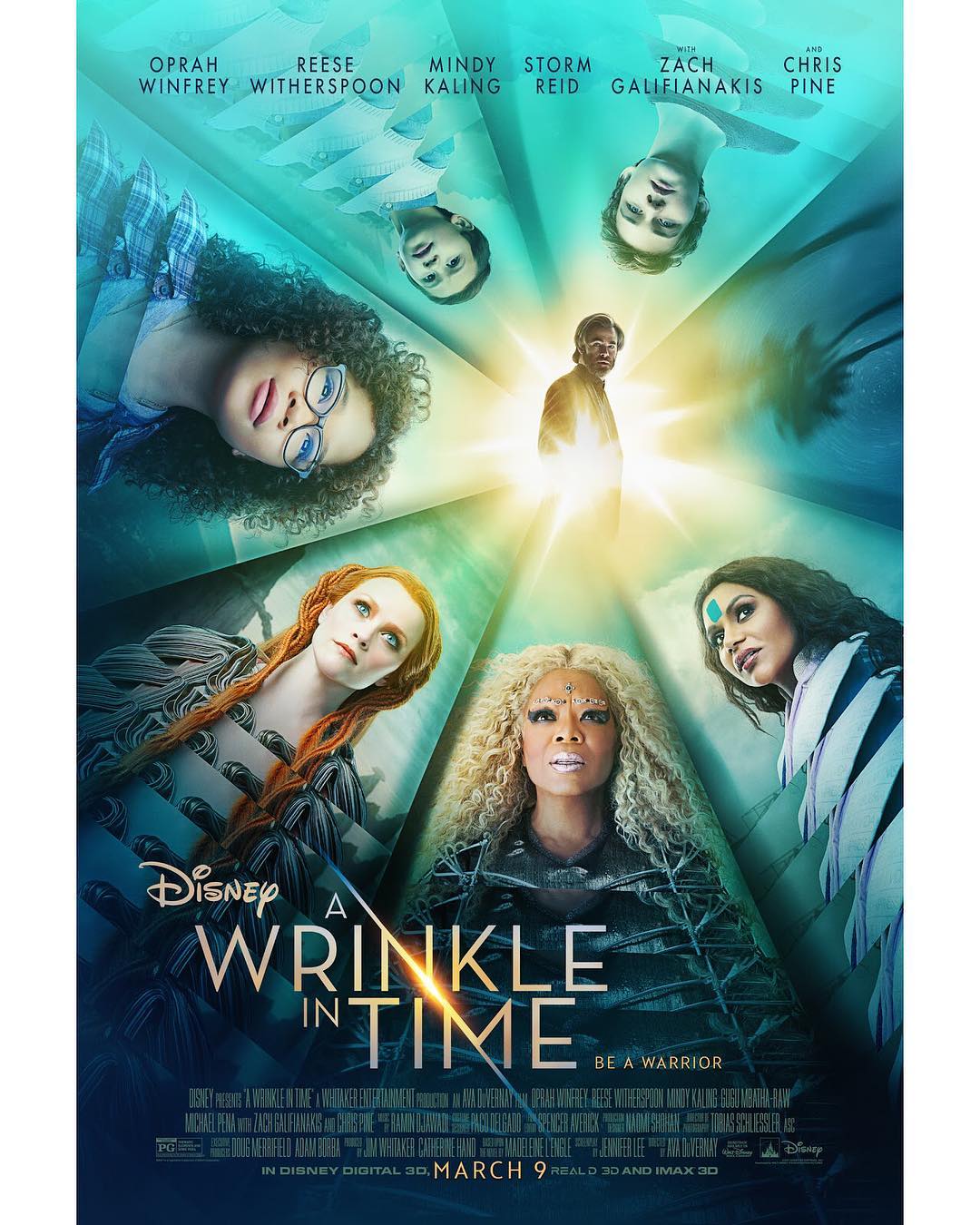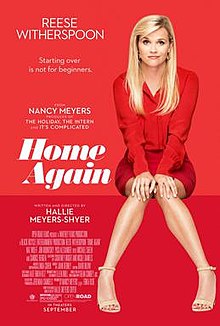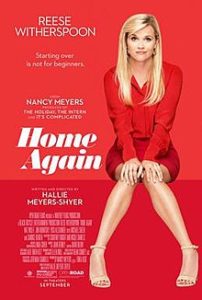A Wrinkle in Time
Posted on March 8, 2018 at 5:38 pm
B +| Lowest Recommended Age: | 4th - 6th Grade |
| MPAA Rating: | Rated PG for thematic elements and some peril |
| Profanity: | None |
| Alcohol/ Drugs: | None |
| Violence/ Scariness: | Extended peril and some violence, some scary images |
| Diversity Issues: | Diverse characters |
| Date Released to Theaters: | March 9, 2018 |
| Date Released to DVD: | June 5, 2018 |

Madeleine L’Engle’s A Wrinkle in Time is one of my all-time favorite books. I loved it when I was 11, read it aloud to our children, and went on to read all of the sequels and most of her other books as well. So it was with a lot of anticipation, excitement, and not a little trepidation that I looked forward to the film.
On the one had, the book had been dismissed over the decades as unfilmable due to its planet-hopping storyline, fantastical characters, and genre-straddling themes. On the other hand, I have the utmost respect for director Ava DuVernay (“Selma,” “13th”) and co-screenwriter Jennifer Lee (“Frozen,” “Zootopia”) and the all-star cast looked promising. I held my breath, crossed my fingers, and leaned forward and caught my breath as the iconic Disneyland castle in the opening logo suddenly…wrinkled.
Most of what I love about the book was beautifully realized, and the movie is sure to be a middle school sleepover perennial and a family favorite for generations. It’s made straight from the heart of people who remember what it feels like to be 12 — and the way we all become 12 again in moments of uncertainty. If there’s a bit more Oprah-esque “you go girl” and “living your best life” than in the book, well, the movie features not just Oprah (who was also in “Selma”) but a house-sized Oprah with lips and eyebrows that look like someone went overboard on the Bedazzler.
Meg Murry (Storm Reid) is the daughter of two scientists (Gugu Mbatha-Raw and Chris Pine). She was once a gifted and attentive student, but since the disappearance of her father, four years before the movie begins, she has been sullen and uncooperative. Mean girls pick on her, and when she responds by throwing a ball at the ringleader, she gets in trouble. Nothing makes sense to her, and she wonders if her father left because she was not good enough.
Meg has an exceptionally precocious six-year-old brother named Charles Wallace (Deric McCabe). In the book, he is her bio-brother and they have two older brothers as well but in the movie it is just the two of them and Charles Wallace was adopted just before their father disappeared. Charles Wallace is one of the major challenges of adapting the book, because on the page he is endearingly hyper-aware and ultra hyper-articulate, but on screen it is difficult to make him believable and keep him from being annoying. It is one of the film’s most salient weaknesses that this critical character does not work.
Meg gradually learns that Charles Wallace has been befriended by three extraordinary and very strange women known as Mrs Whatsit (Reese Witherspoon), Mrs Who (Mindy Kaling), and Mrs Which (Oprah Winfrey). (NOTE: L’Engle insisted that there be no period after “Mrs” in the British style.) As disturbing as it is reassuring, they seem to know what the Murrys were working on, a form of “wrinkling” time and space to permit instantaneous travel to other planets that they call a tesseract. (For some reason, the explanation appears in the trailer, but not the film.)
Calvin O’Keefe (Levi Miller), is a well-liked, confident boy who seems to have nothing in common with the Murray children. But one day he impulsively visits them, and stays for dinner, appreciating the warmth and acceptance in their home. And then the three ladies explain why they are there. They have heard a call for help. It is the children’s father. And they are there to help Meg, Calvin, and Charles Wallace rescue him from “the darkness.”
And so, the rest of the film is candy-colored CGI, as the group visits first a paradisiacal planet for no particular reason other than a romp through a delightful garden of gossipy flying flowers who communicate via color and a soaring tour on a creature like a flying green manta ray with a rainbow Reese Witherspoon face. They visit a psychic called the Happy Medium (Zach Galifianakis) for more information about where Dr. Murry has gone, and finally they get to the planet where he is being held captive by an all-controlling force. The film brings to life one of the book’s most vivid scenes, with a pristine suburban street where every house has a child standing in the driveway bouncing a ball in perfect rhythm and all of the Stepford-style moms come out at the same moment to call them in to dinner. The book was written a a time of post-WWII concerns about conformity and “houses made of ticky-tacky that all look just the same.” But the image is just as compelling today. The 1950’s may have led to an explosion of “do your own thing” individuality in the mid-to late 1960’s and self-actualization in the me-decade 70’s, but the importance of intellectual courage, thinking for yourself, and challenging assumptions is even more important in the era of fake news and “both sides.”
The book’s most memorable message comes when Meg is told that what will help her to rescue her father is her faults. Though how those faults help is not as explicitly explained in the film, that idea retains its power here. That makes up for some faltering in the climax, some under-imagined images, and some distractions that seem to stem from a lack of trust in the audience. We don’t really need that extra back story on the mean girl or Calvin (an odd change from his home life in the books, which will be a problem if they decide to film the sequels) to understand what their insecurities are or the time spent cheering Meg on (and apologizing to her and deferring to her) without making it clear what her strengths are and how they are connected to her faults. It would be better to focus on the book’s rare combination of both faith and science and how important both are. In the book, the children visit the planets to learn about the darkness and to see that it can be overcome (Mrs Whatsit is the result of one such triumph). The movie leans more toward an Oprah-eque message of empowerment, so the focus is more on individual self-realization (and being appreciated by others, including Calvin, which seems to be his primary purpose in the story).
The three Mrses are not quite as fun as the movie thinks, though Mrs Who’s Bumblebee-like “post-language” use of quotations (always noting the nationality of the author, from Rumi and Shakespeare to Lin-Manuel Miranda and OutKast) is charming. But Reid is a heroine to root for, and the Murry family is one we are, like Calvin, glad to have a chance to visit.
Parents should know that this film includes extended sci-fi/fantasy peril with some violence and scary images, issues of an absent father, a school bully, and an abusive parent.
Family discussion: What are your most valuable faults? Why was Meg so important to IT?
If you like this, try: “The Neverending Story,” “The Wizard of Oz,” and the Narnia series




